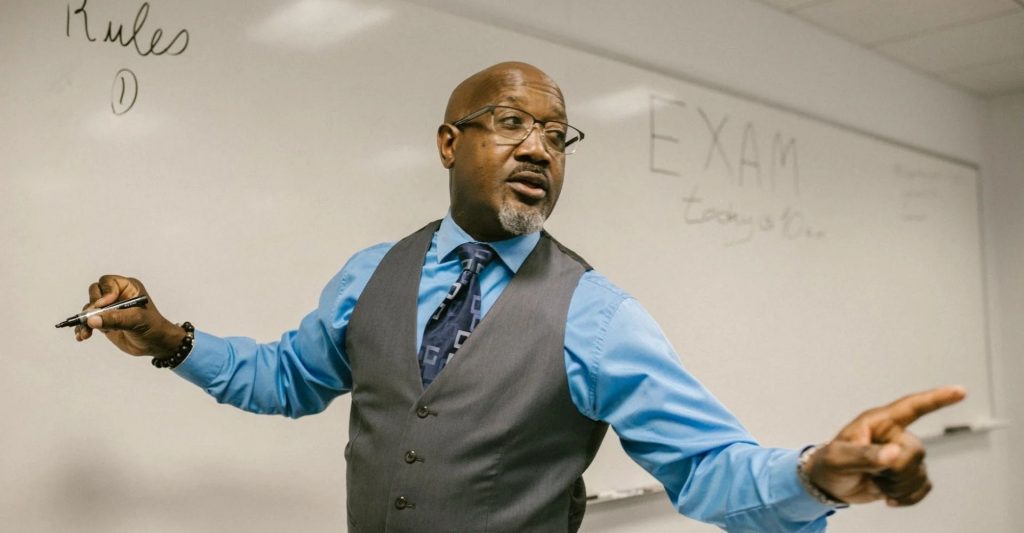
We are a reader-supported education publication. When you buy through links on our site, we may earn an affiliate commission to help us keep providing content.
It’s possible to find your lifelong home in academia. While you may not always be on the student end of the classroom, it’s crucial to make the most of your life as a student to prepare for your future. Learning how to become a science professor is more than just taking classes in your field.
Professors hold numerous jobs with varying degrees of responsibility. If you want to be a college professor, you should start as soon as you’ve determined you want a future in academia after your career as a student. It’s never too early to begin preparing for your dream career.
What Do Science Professors Do?
Many people want to know how to become a science professor, but few know all the responsibilities of teaching at the collegiate level. Professors must manage their ongoing research and findings while also supporting their students.
Here are just a few of the responsibilities a college professor takes on:
- Participating in faculty meetings, especially if they’re the department head.
- Advising students on the next steps in their college careers.
- Conducting research and publishing their findings.
- Developing courses and materials.
- Holding classes frequently throughout the week.
- Grading work outside of class time.
- Providing or arranging tutoring or extra meetings for students that need it.
Among those responsibilities are so many more that differ depending on the field. As a professor, you should anticipate thriving in a fast-paced environment.
Professors in the United States make an average of around $72,000 a year, but that number varies greatly depending on the state and experience level of the professor. You should not expect to make that much right out of school, but with years of hard work and dedication to your field, you can become tenured and have a greater salary.

How to Become a Science Professor in 7 Steps
By deciding what you want to do as a career, you’ve already taken your first steps toward becoming a professor. Knowing how to become a science professor is half the battle, but the rest of it lies in preparing yourself for the years of school and dedication to your field.
1. Choose a Specialty
“Science” is a broad term. In elementary school, being a science teacher may encompass quite a few disciplines, but choosing a specific field is mandatory when you’re going into higher education.
The primary categories of science that you can go into are as follows:
- Earth Science: the science of the earth and atmosphere.
- Biology: the science of living organisms.
- Chemistry: the science that works with chemicals and components of things.
- Physics: the science that deals with energy and matter.
You can niche down and find where you fit, but majoring in one of those four fields can help open doors for what you want to do in the future, especially if your school of choice doesn’t have a more specific degree.
2. Get Your Undergraduate Degree
Your undergraduate years are a time to focus on maintaining an excellent GPA that will help you get into graduate school. Still, you should also use the time to have fun, build your resume, and develop much-needed skills in the world of academia. You might have to take education classes that help you learn how to run a classroom properly and allow the students to benefit from your teachings.
Enjoy your undergraduate time. Your years in college are supposed to teach you how to manage your time wisely. Take every opportunity to work hard and reward yourself, as the work will become harder as you continue your academic career.
3. Secure Internships
It might be easier to juggle internships when you’re in your undergraduate career because you won’t have as much work to complete. Search for internships in your field of science that can teach you something you didn’t already know. Seeking out the opportunity to tutor others in science is also an excellent way to build some teaching experience.
Internships can help you improve your research skills and prepare you for the future. While many internships don’t pay for your work, you can consider the knowledge and experience you gain as payment for your work. The point of internships is to teach you about ideas and processes you might not yet know, thereby bettering you for the future and making you look more competitive and professional.

4. Earn Your Graduate Degree
Your graduate degree will involve more science classes than your undergraduate degree. In your undergraduate career, you explore a variety of classes in addition to those for your major and minor. As a graduate student, you’ll mostly be focused on the field of your choice — likely a more specialized category of one of the aforementioned types of science.
You’ll see more intense work than in your undergraduate career. You learned time management in your undergraduate career and should implement those techniques at this stage of your journey, too. The material gets more challenging from this stage onward, but it also becomes all the more worthwhile.
5. Become an Assistant Professor
Being an assistant professor in addition to your graduate studies may help you move up the ladder faster when you’re ready for a full-time teaching job due to the experience you already have.
Your school might require you to teach some introductory courses, or you may be able to volunteer for the task. Even if it isn’t mandatory, you should consider getting some experience in the classroom. Since being an assistant professor or teaching assistant is work experience, you can use it on your resume.
6. Complete Your Doctorate Degree
Most professors hold a Ph.D. in their relevant field. If you want a better chance of becoming a tenured professor, continuing your education beyond your Master’s degree is a must. While some professors can hold jobs with only Master’s degrees, having a doctorate is the easiest way to ensure job security.
A doctorate degree might take around four to six years to complete depending on the program. During this time, you should be researching and striving for the experience that can help you obtain a job post-graduation.
7. Apply for Jobs and Gain Experience
After you receive your doctorate degree, you’ll need to continue working toward gaining experience that makes you a competitive candidate for teaching jobs. While you’re applying for jobs, you should continue your research and attempt to publish your findings. More publications may give you a leg up over your competition for professor jobs.
Some of this “experience” can come from making connections. By attending conventions or seminars and making connections with professors or others striving to do the same thing as you, you might open up new opportunities for yourself.
Stepping Into the World of Science
With numerous disciplines, science offers something for everyone. Learning how to become a science professor is the first rung of a tall ladder to becoming a tenured professor with an excellent reputation. With diligence and hard work, you’ll grow into an impressive educator who makes a difference.









